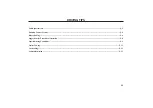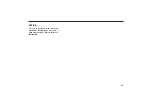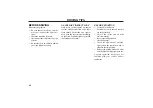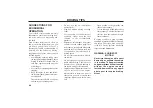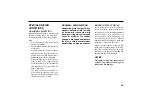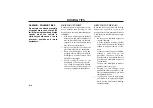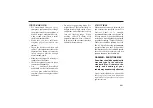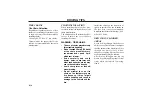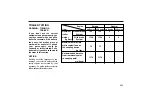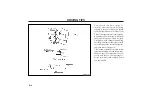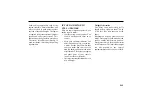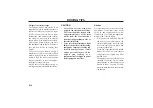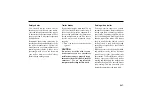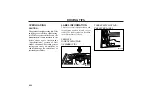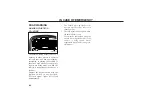
Load-pulling components such as the
engine, transaxle, wheel assemblies, and
tires are forced to work harder against
the load of the added weight. The engine
is required to operate at relatively higher
speeds and under greater loads. This
additional burden generates extra heat.
The trailer also adds considerably to
wind resistance, increasing the pulling
requirements.
IF YOU DO DECIDE TO
PULL A TRAILER
Here are some important points if you
decide to pull a trailer:
•
Consider using a sway control. You
can ask a hitch dealer about sway
control.
•
After your odometer indicates 500
miles (800 km) or more, you can tow
a trailer. For the first 500 miles that
you tow a trailer, don’t drive over 50
mph (80 km/h) and don’t make starts
at full throttle. This helps your engine
and other parts of your vehicle
“wear” in at the heavier loads.
•
The important considerations have to
do with weight:
Weight of the trailer
How heavy can a trailer safely be? It
should never weigh more than 1700 kg
(3748 lbs.). But even that can be too
heavy.
It depends on how you plan to use your
trailer. For example, speed, altitude, road
grades, outside temperature and how
much your vehicle is used to pull a trailer
are all important. The ideal trailer weight
can also depend on any special
equipment that you have on your vehicle.
5-15
Summary of Contents for Optima 2004
Page 4: ...How To Use This Manual 1 2 Vehicle Break In Process 1 3 INTRODUCTION 1 1 ...
Page 7: ...Interior and Exterior Overview 2 2 Instrument Panel Overview 2 3 YOUR VEHICLE AT A GLANCE 2 1 ...
Page 11: ...KNOWING YOUR VEHICLE 3 2 Sunglass Holder 3 70 Sunroof 3 70 Antenna 3 73 Luggage Net 3 75 ...
Page 179: ...TIE DOWN HOOKS FOR FLATBED TOWING IN CASE OF EMERGENCY 6 14 Front Rear EMSA6009B RMSA601A ...

